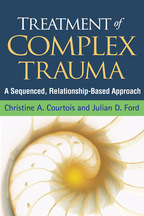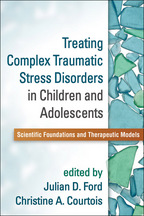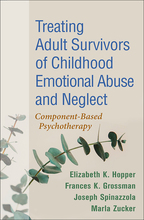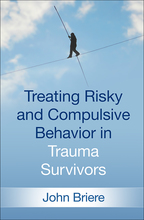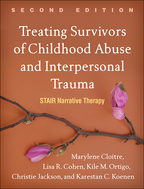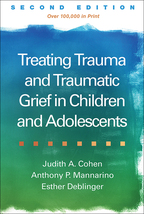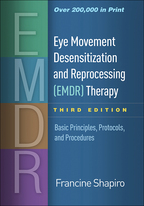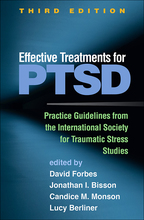Treatment of Complex Trauma
A Sequenced, Relationship-Based Approach
Christine A. Courtois and Julian D. Ford
Foreword by John Briere
HardcoverPaperbacke-bookprint + e-book
Hardcover
orderNovember 7, 2012
ISBN 9781462506583
Price: $68.00 378 Pages
Size: 6⅛" x 9¼"
Paperback
orderSeptember 21, 2015
ISBN 9781462524600
Price: $45.00378 Pages
Size: 6⅛" x 9¼"
Read a Q&A with featured author, Julian D. Ford!
Sign up for emails on upcoming titles on Trauma & PTSD (with special discounts)!
Sign up for emails on upcoming titles on Trauma & PTSD (with special discounts)!
“This is a must-have for any clinician working with patients with trauma on a daily basis and for those therapists who do not necessarily have a specialization in trauma, but would like to get more knowledgeable about complex trauma. It should also be a required textbook for graduate students, especially doctoral level students interested in working in and/or researching PTSD situations.”

—Doody's Review Service
“Courtois and Ford have demonstrated that they are masters of their subject and are masterful in communicating about the treatment of a very difficult patient population and have contributed a masterpiece in their book….This book is not only essential reading for therapists who want to take on the challenge of treating patients with complex trauma but also an excellent source for any professional who engages in psychotherapy. The reader comes away with not only important tools in establishing a meaningful relationship with patients but also a sense of the gratification that results from treating patients and being a partner in their growth and development.”

—Journal of Nervous and Mental Disease
“Both authors have worked extensively with survivors of complex trauma, and share their wisdom and experience in this book. At a time when this clinical population is becoming more visible to clinicians, this thoughtful, extensively documented work is a real treasure. The book has already had a profound effect on the field, and has introduced many previously unaware clinicians to foundational concepts. The emphasis on therapist self-care and the ways in which the authors underscore the central importance of therapist self-awareness and self-regulation are particularly valuable.”

—Laura S. Brown, PhD, ABPP, past president, Division of Trauma Psychology, American Psychological Association; private practice, Seattle, Washington
“Courtois and Ford, two internationally acknowledged experts, have written a magnificent book on the nature and phase-oriented treatment of complex trauma. Destined to become an instant classic, the book is illustrated throughout with instructive case material. It is at once an excellent guide for the uninitiated and an outstanding resource for experienced clinicians in the field. As most forms of complex trauma occur in interpersonal relationships, the book's emphasis on the therapeutic relationship as the vehicle for healing contributes to its importance.”

—Onno van der Hart, PhD, Department of Clinical and Health Psychology (Emeritus), Utrecht University, The Netherlands
“Treatment of Complex Trauma is an excellent book for graduate Complex Trauma courses, as it provides a wide range of treatment strategies for clinicians to use with clients. The book give students a thorough understanding of PTSD and complex trauma. It offers a comprehensive overview of treatment measures, ways to build the therapeutic relationship, and clinician self-care.”

—Toby Spiegel, PsyD, Associate Dean, School of Behavioral Sciences, California Southern University
“The state of the art of treating complex trauma, both the basics and the nuances, as summarized by two wise and sophisticated experts.”

—Judith Lewis Herman, MD, Department of Psychiatry, Harvard Medical School
“Finally! We have long needed a clinical guidebook that takes treatment providers through the process of therapy for complex posttraumatic stress syndromes, which are among the greatest challenges that professionals encounter. Courtois and Ford's broad and deep clinical experience shines through in their discussion of assessment, engagement, and treatment—as do their optimism, passion, and hope.”

—Sandra L. Bloom, MD, founder, The Sanctuary Model
“Courtois and Ford provide detailed guidelines for conducting their sequenced treatment approach, from preparation, assessment, and planning, to each of the phases of therapy. The book covers the 'meat and potatoes' of trauma therapy: ensuring client safety, cultivating the therapeutic relationship, and processing trauma memories. It includes strategies from different theoretical approaches and treatment modalities and addresses more complex processes, such as psychic emptiness and dissociation. Written with exceptional clarity, compassion, and respect, and richly illustrated with clinical material, this is an invaluable resource for clinicians.”

—Sandra C. Paivio, PhD, CPsych, Department of Psychology, University of Windsor, Ontario, Canada
—Doody's Review Service
“Courtois and Ford have demonstrated that they are masters of their subject and are masterful in communicating about the treatment of a very difficult patient population and have contributed a masterpiece in their book….This book is not only essential reading for therapists who want to take on the challenge of treating patients with complex trauma but also an excellent source for any professional who engages in psychotherapy. The reader comes away with not only important tools in establishing a meaningful relationship with patients but also a sense of the gratification that results from treating patients and being a partner in their growth and development.”
—Journal of Nervous and Mental Disease
“Both authors have worked extensively with survivors of complex trauma, and share their wisdom and experience in this book. At a time when this clinical population is becoming more visible to clinicians, this thoughtful, extensively documented work is a real treasure. The book has already had a profound effect on the field, and has introduced many previously unaware clinicians to foundational concepts. The emphasis on therapist self-care and the ways in which the authors underscore the central importance of therapist self-awareness and self-regulation are particularly valuable.”
—Laura S. Brown, PhD, ABPP, past president, Division of Trauma Psychology, American Psychological Association; private practice, Seattle, Washington
“Courtois and Ford, two internationally acknowledged experts, have written a magnificent book on the nature and phase-oriented treatment of complex trauma. Destined to become an instant classic, the book is illustrated throughout with instructive case material. It is at once an excellent guide for the uninitiated and an outstanding resource for experienced clinicians in the field. As most forms of complex trauma occur in interpersonal relationships, the book's emphasis on the therapeutic relationship as the vehicle for healing contributes to its importance.”
—Onno van der Hart, PhD, Department of Clinical and Health Psychology (Emeritus), Utrecht University, The Netherlands
“Treatment of Complex Trauma is an excellent book for graduate Complex Trauma courses, as it provides a wide range of treatment strategies for clinicians to use with clients. The book give students a thorough understanding of PTSD and complex trauma. It offers a comprehensive overview of treatment measures, ways to build the therapeutic relationship, and clinician self-care.”
—Toby Spiegel, PsyD, Associate Dean, School of Behavioral Sciences, California Southern University
“The state of the art of treating complex trauma, both the basics and the nuances, as summarized by two wise and sophisticated experts.”
—Judith Lewis Herman, MD, Department of Psychiatry, Harvard Medical School
“Finally! We have long needed a clinical guidebook that takes treatment providers through the process of therapy for complex posttraumatic stress syndromes, which are among the greatest challenges that professionals encounter. Courtois and Ford's broad and deep clinical experience shines through in their discussion of assessment, engagement, and treatment—as do their optimism, passion, and hope.”
—Sandra L. Bloom, MD, founder, The Sanctuary Model
“Courtois and Ford provide detailed guidelines for conducting their sequenced treatment approach, from preparation, assessment, and planning, to each of the phases of therapy. The book covers the 'meat and potatoes' of trauma therapy: ensuring client safety, cultivating the therapeutic relationship, and processing trauma memories. It includes strategies from different theoretical approaches and treatment modalities and addresses more complex processes, such as psychic emptiness and dissociation. Written with exceptional clarity, compassion, and respect, and richly illustrated with clinical material, this is an invaluable resource for clinicians.”
—Sandra C. Paivio, PhD, CPsych, Department of Psychology, University of Windsor, Ontario, Canada

